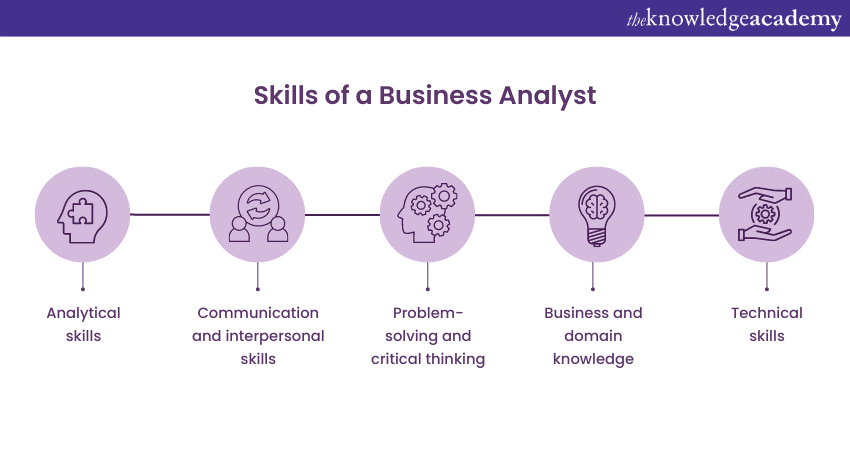We may not have the course you’re looking for. If you enquire or give us a call on 01344203999 and speak to our training experts, we may still be able to help with your training requirements.
Training Outcomes Within Your Budget!
We ensure quality, budget-alignment, and timely delivery by our expert instructors.

In the constantly changing world of business, there is an important role that often works in the background but is essential to an organisation's success. That role is that of a Business Analyst (BA). Whether you're aspiring to enter the field of Business Analysis or simply curious about What a Business Analyst is, this blog is here to provide you with a comprehensive understanding.
A Business Analyst is a professional responsible for analysing an organisation's operations, processes, and systems to identify areas of improvement. They possess a unique skill set that combines business acumen, analytical thinking, and technical expertise. To learn more about their skills and qualifications, read this blog on What is a Business Analyst and shape a promising career for yourselves. Read now to learn more!
Table of Contents
1) Understanding What is a Business Analyst
2) What does a Business Analyst do?
3) Skills and qualifications of a Business Analyst
4) Why pursue a career in Business Analysis?5) Business Analyst Job Description example
5) Conclusion
Understanding What is a Business Analyst
A Business Analyst (BA) serves as a mediator between business stakeholders and the technical team of an organisation. They play a vital role in understanding and analysing the business needs, identifying problems and opportunities, and providing strategic solutions to achieve organisational objectives.
The primary objective of a Business Analyst is to bridge the gap between business goals and IT capabilities. They work closely with stakeholders, including executives, managers, clients, and end-users, to gather requirements, define project scope, and ensure that solutions align with business objectives. By understanding the intricacies of business processes and operations, these professionals can effectively translate business requirements into technical specifications.
Business Analysts employ various techniques and tools to elicit, analyse, and document requirements. They conduct thorough research, perform data analysis, and engage in process modelling to identify areas for improvement and optimise business operations. They also facilitate communication between stakeholders, ensuring that everyone's perspectives and needs are considered.
In addition to requirements gathering, Business Analysts contribute to solution design, evaluating potential options and recommending the most suitable course of action. They collaborate with development teams, providing clarifications and assisting in the implementation phase. Throughout the project lifecycle, Business Analysts continuously assess and validate solutions to ensure they meet the desired outcomes.
Responsibilities of a Business Analyst
A BA is responsible for various activities that help achieve the success of a project and the overall goals of the business. Let's explore the core responsibilities of a Business Analyst:
1) Requirements gathering: One of the primary responsibilities of a Business Analyst is to gather and document requirements from stakeholders. They engage in discussions, interviews, and workshops to understand the needs, expectations, and constraints of the business. By eliciting requirements effectively, Business Analysts ensure that the project aligns with the desired outcomes.
2) Stakeholder management: Business Analysts work closely with stakeholders, including business users, clients, and project teams. They facilitate communication, manage expectations, and build strong relationships with stakeholders to ensure their needs are understood and addressed throughout the project lifecycle. This involves active listening, conflict resolution, and negotiation skills.
3) Process improvement: Business Analysts identify inefficiencies and areas for improvement within existing business processes. They analyse workflows, gather feedback, and propose solutions to optimise operations, enhance productivity, and reduce costs. Through process modelling techniques, such as business process mapping and reengineering, Business Analysts help organisations streamline their operations.
4) Data analysis: Business Analysts play a crucial role in data analysis, extracting meaningful insights from large datasets. They use various tools and techniques to analyse data, identify trends, and make data-driven recommendations. Data analysis enables them to understand customer behaviour, market trends, and operational performance, supporting informed decision-making.
5) Solution design and implementation: Business Analysts actively participate in solution design and implementation phases. They collaborate with technical teams to translate business requirements into functional specifications and user stories. They provide clarifications, assist in resolving issues, and ensure that the implemented solutions align with the business objectives.
6) Documentation and communication: Clear and concise documentation is a vital responsibility of Business Analysts. They create requirements documents, process flowcharts, user manuals, and other relevant documentation to ensure that project stakeholders have a comprehensive understanding of the project scope and requirements. They also communicate effectively across teams, ensuring that everyone is aligned and working towards a common goal.
7) User Acceptance Testing (UAT) support: Business Analysts assist in the UAT process, collaborating with end-users to validate that the developed solutions meet the specified requirements. They coordinate test plans, collect feedback, and facilitate issue resolution to ensure a successful UAT phase.
8) Continuous improvement: Business Analysts are continuously seeking ways to improve their own practices and contribute to the improvement of business analysis processes within their organisation. They stay updated with industry trends, adopt best practices, and actively participate in communities of practice.
Unleash the power of effective stakeholder engagement, foster collaboration, and drive project success with our Creating Effective Stakeholder Engagement course.
Skills and qualifications of a Business Analyst
Being a successful Business Analyst requires a unique combination of technical expertise, analytical thinking, and effective communication skills. The following are some essential skills and qualifications that contribute to the success of a Business Analyst:

1) Analytical skills: Business Analysts must possess strong analytical skills to understand complex business processes, identify patterns, and extract valuable insights from data. They should be proficient in data analysis techniques, and able to interpret and make informed decisions based on the information gathered.
2) Communication and interpersonal skills: Effective communication is vital for Business Analysts as they interact with diverse stakeholders, including business users, developers, managers, and executives. They must be skilled at listening actively, facilitating discussions, and conveying information clearly and concisely. Additionally, strong interpersonal skills enable them to build relationships, resolve conflicts, and negotiate effectively.
3) Problem-solving and critical thinking: Business Analysts need to think critically and approach problems analytically. They should be able to identify root causes, evaluate potential solutions, and make informed decisions that align with the organisation's objectives. Exceptional problem-solving skills allow them to navigate complex situations and overcome challenges.
4) Business and domain knowledge: A solid understanding of business principles, industry trends, and domain-specific knowledge is essential for a Business Analyst. They should comprehend the intricacies of the business environment in which they operate, enabling them to identify opportunities and propose relevant solutions.
5) Technical skills: While not always required to have deep technical expertise, Business Analysts should possess a good understanding of technology and its implications. Familiarity with software development methodologies, databases, and project management tools allows them to effectively collaborate with technical teams and translate business requirements into technical specifications.
Qualifications and certifications:
While a specific degree is not required to become a Business Analyst, having a background in business, information technology, or a related field can be beneficial. Many Business Analysts hold bachelor's degrees in business administration, computer science, or a related discipline. Additionally, obtaining professional certifications such as the International Institute of Business Analysis (IIBA) Certified Business Analysis Professional (CBAP) or the Project Management Institute (PMI) Professional in Business Analysis (PMI-PBA) demonstrates expertise and dedication to the field.
Continued professional development is crucial for Business Analysts. They should stay updated with industry trends, attend relevant training programs, and participate in communities of practice to enhance their skills and knowledge.
Master the art of analysis, and drive impactful change with our specialised CBA-PRO Training - join today!
Why consider a career in Business Analysis?
Business Analysis is a crucial function within organisations, serving as the linchpin between business objectives and technological capabilities. It encompasses understanding business requirements, evaluating the impact of changes, documenting and managing requirements, and facilitating stakeholder communication. A career in Business Analysis is highly rewarding for several reasons:
a) High demand: Business analysts are sought after for their expertise in enhancing business efficiency through insightful data analysis.
b) Diverse challenges: The role offers diverse challenges, ensuring a dynamic and engaging work environment.
c) Competitive salaries: Business analysts are well-compensated, with salaries reflecting the significant value they add to organisations.
d) Meaningful impact: They play a key role in the success of projects and strategic business initiatives.
Business Analyst salary
Business Analysts in the UK can expect:
a) Starting salaries: For newcomers to the field, the starting salary ranges from £32,000 to £ 56,000 annually.
b) Experienced professionals: With greater experience, Business Analysts can command salaries of £45,000 to £75,000, and even beyond £80,000 for highly experienced individuals, particularly in the finance sector.
Job Outlook for Business Analysts
The job outlook for Business Analysts in the UK is exceptionally positive:
a) Growth: The field is anticipated to expand, with a projected increase in demand for Business Analysts.
b) Opportunities: As organisations increasingly depend on data-driven decision-making, the need for proficient Business Analysts is on the rise.
Conclusion
The role of a Business Analyst (BA) encompasses a wide range of responsibilities, from gathering requirements to facilitating project management. BAs possess a unique skill set that combines technical expertise, business acumen, and strong communication skills. We hope that after reading this blog you have got an idea of What is a Business Analyst!
Unlock your potential in the field of business analysis, acquire essential skills, and propel your career forward with our comprehensive Business Analyst Course.
Frequently Asked Questions

Networking and professional development are pivotal for advancing a Business Analyst’s career. Establishing connections within the industry fosters opportunities for collaboration and knowledge exchange. Both networking and ongoing learning contribute to a robust professional profile, opening doors to career advancements.

The role of a Business Analyst adapts to the unique needs of various industries. In finance, analysts focus on risk management and compliance, while in technology, they emphasise system integration and software requirements. Healthcare analysts delve into process optimisation for better patient care.

The Knowledge Academy’s Knowledge Pass, a prepaid voucher, adds another layer of flexibility, allowing course bookings over a 12-month period. Join us on a journey where education knows no bounds.

The Knowledge Academy takes global learning to new heights, offering over 30,000 online courses across 490+ locations in 220 countries. This expansive reach ensures accessibility and convenience for learners worldwide.
Alongside our diverse Online Course Catalogue, encompassing 17 major categories, we go the extra mile by providing a plethora of free educational Online Resources like News updates, Blogs, videos, webinars, and interview questions. Tailoring learning experiences further, professionals can maximise value with customisable Course Bundles of TKA.

The Knowledge Academy offers various Business Analyst Courses, including Business Process Mapping Training, Statistics Course, Business Analyst Fundamentals Training and more. These courses cater to different skill levels, providing comprehensive insights into various Types of Regression Analysis.
Our Business Analysis Blogs cover a range of topics related to Stakeholder Management, offering valuable resources, best practices, and industry insights. Whether you are a beginner or looking to advance your Business Analysis skills, The Knowledge Academy's diverse courses and informative blogs have you covered.
Upcoming Business Analysis Resources Batches & Dates
Date
 Certified Business Analyst Professional (CBA-PRO)
Certified Business Analyst Professional (CBA-PRO)
Thu 6th Jun 2024
Thu 10th Oct 2024
Thu 19th Dec 2024







 Top Rated Course
Top Rated Course



 If you wish to make any changes to your course, please
If you wish to make any changes to your course, please


